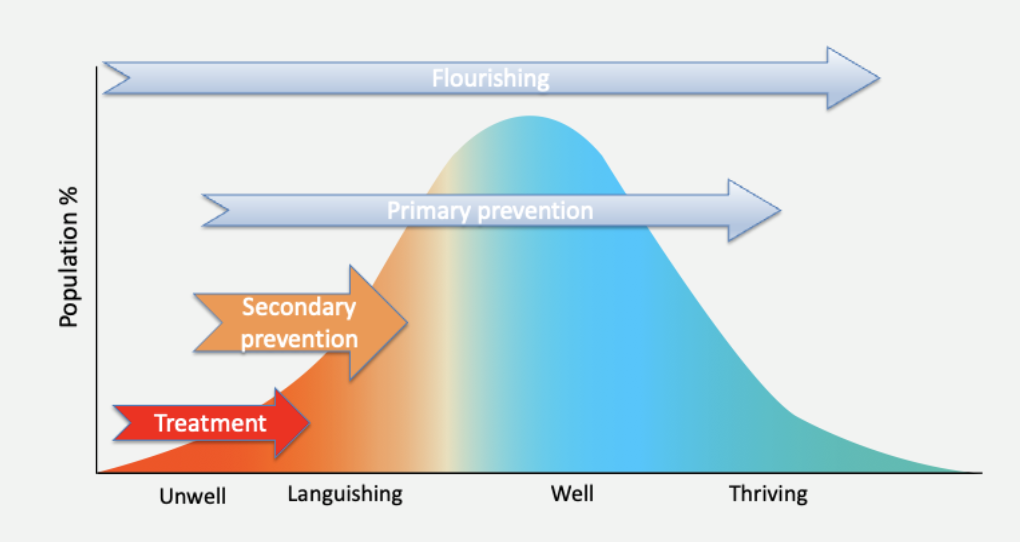Preventing Depression Relapse: Helping Clients Sustain Long-Term Mindfulness
Jul 03, 2025
Learn how to support clients in sustaining mindfulness as a practical, values-based approach to treating depression, preventing relapse, and fostering long-term resilience.
Depression is one of the most common and persistent mental health conditions, affecting more than 250 million people worldwide. While treatments such as medication, psychotherapy, and mindfulness-based programs can be highly effective, the deeper challenge lies in what comes next: How do we help people not only recover, but stay well?
“People don’t just want to stay out of depression—they want to live well, to flourish.” - Willem Kuyken, Ph.D. ClinPsych
Willem Kuyken, Ph.D. ClinPsych—Oxford professor, clinical psychologist, and researcher —challenges us to rethink relapse prevention not as a clinical endpoint, but as a lifelong journey of healing, resilience, and growth. He invites helping professionals to support clients in weaving mindfulness into daily life—not as another task, but as a way of being.
In our on-demand workshop, Preventing Depression Relapse with Mindful Action Strategies, Dr. Kuyken offers practical guidance to help professionals support clients in integrating mindfulness meaningfully and sustainably.
This article, grounded in Dr. Kuyken’s teachings, explores depression as a chronic, relapsing condition and demonstrates how mindfulness can foster long-term recovery, well-being, and the possibility of flourishing.
Contents:
- The Challenge of Depression: A Relapsing Condition
- From Treatment to Prevention to Flourishing
- Mindfulness as a Long-Term Strategy for Preventing Depression Relapse & Staying Well
- Supporting Clients in Sustaining Mindfulness to Prevent Depression
- Learn More: Preventing Depression Relapse with Mindful Action Strategies
The Challenge of Depression: A Relapsing Condition
Depression is best understood not as a one-time illness, but as a relapsing and recurrent condition—similar to diabetes or heart disease. The World Health Organization estimates over 250 million people are currently affected, with many experiencing their first episode in adolescence or early adulthood.
Treatments that Work
Traditional care models have rightly emphasized treatment at various stages—ranging from lifestyle support for mild depression to psychotherapy and medication for more severe presentations. The NICE Matched Care Model (NICE, 2022) provides a structured framework for this, offering a stepped and personalized approach to care. It emphasizes delivering the least intrusive, most effective intervention first, while remaining responsive to individual needs as they change over time.

This approach supports a flexible continuum—from self-guided digital interventions and group psychoeducation to high-intensity psychological therapies and pharmacological support—ensuring that treatment is responsive, proportionate, and person-centered.
However, while these treatments are effective at alleviating symptoms, they often fall short of addressing the deeper question: how can people stay well over the long term?
The NICE Matched Care Model offers a stepped, personalized approach—ensuring that care is responsive, proportionate, and person-centered. Dr. Kuyken builds on this foundation by encouraging a broader view: one that integrates not just treatment, but also prevention and the ongoing cultivation of well-being.
From Treatment to Prevention to Flourishing
Just as cardiac care evolved to incorporate prevention and lifestyle support, mental health care must move beyond symptom reduction toward sustained well-being. Kuyken encourages us to support clients not only in recovery, but in cultivating resilience, connection, and meaning.
Rethinking the Continuum of Care
Dr. Kuyken offers a revised model of care that integrates mindfulness as a support across three interconnected domains:
- Treatment: Alleviating symptoms during acute episodes through evidence-based therapies such as cognitive therapy, medication, and behavioral interventions.
- Prevention: Equipping people with the skills to recognize early warning signs, navigate difficult emotions, and relate differently to unhelpful patterns—thereby reducing the risk of future episodes.
- Flourishing: Enabling people to live lives marked by connection, agency, kindness, and a deepened sense of purpose.

Visual: The Mental Health Continuum – From Treatment to Flourishing
This diagram illustrates the spectrum of care from treatment through secondary and primary prevention to flourishing. It emphasizes a population-level approach, with mindfulness supporting each phase—not only for recovery but for lifelong well-being.
Mental health, Dr. Kuyken explains, is not a binary state of ill or well. It’s a dynamic, lived experience shaped by awareness, intention, and wise action. Mindfulness offers a foundation—not just for preventing relapse, but for helping people thrive.
Mindfulness as a Long-Term Strategy for Preventing Depression Relapse & Staying Well
Mindfulness-Based Cognitive Therapy (MBCT) was developed for those no longer in an acute episode of depression but still at risk of relapse. It combines cognitive therapy’s attention to thought patterns with mindfulness practices that cultivate presence, self-compassion, and perspective.
A Proven Tool for Prevention
Research—including 12 randomized controlled trials and multiple meta-analyses—shows MBCT is not only effective, but as effective as maintenance antidepressants in preventing relapse.
Crucially, MBCT doesn’t just disrupt negative thinking—it helps people build internal resources for lasting change. It teaches:
- Recognition of early warning signs
- Emotional regulation and acceptance
- Perspective taking and decentering from thoughts
As Dr. Kuyken emphasizes, this is about more than prevention. It’s about nurturing “the possibility of flourishing.” Mindfulness helps people become more aware of what matters, more able to act with intention, and more resilient in the face of life’s challenges.
Supporting Clients in Sustaining Mindfulness to Prevent Depression
When supporting clients with depression, one of the biggest challenges is helping them sustain mindfulness in meaningful, accessible ways. Kuyken offers three key strategies:
1. Keep It Doable
Mindfulness doesn't need to be long or formal. It can live in ordinary moments: feeling the breath before replying to an email, savoring morning coffee, or pausing while brushing teeth. These “everyday entry points” make mindfulness sustainable. Support your clients in finding the everyday entry points that work for them.
2. Normalize the Process
It's common for clients to hope that mindfulness will bring relief or immediate calm. But as Dr. Kuyken explains, mindfulness is about forgetting and returning—again and again. That is the practice. Normalizing lapses as part of the journey helps build resilience and self-trust. Encourage clients to reflect regularly—at the end of the day, week, or year—by asking questions like: “What did I savor today?” “When did I forget to be present?” “What did I learn from that?” These simple check-ins foster a compassionate mindset and reinforce that forgetting isn’t failure—it’s part of the path.
3. Make It Meaningful
Sustainability comes when practice aligns with personal values. Help clients identify what they care about—connection, creativity, joy—and explore how mindfulness might already be alive in those spaces. Then support them in bringing mindful attention, appreciation, and care into those moments. Whether it’s playing with a child, running outdoors, or making a meal, mindfulness becomes a companion, not a chore.
Integrating Mindfulness into the Therapeutic Process
Mindfulness is not just something to teach—it’s something to live. One small but powerful study (Grepmair, 2007), showed that clients of therapists in training who learned mindfulness experienced better outcomes than those trainee therapists who didn’t. The difference? The therapists’ own ability to embody mindful presence.
By integrating mindfulness into your own life and clinical work, you offer clients more than a set of tools. You offer a model of compassionate presence, a reminder that flourishing is not about being perfect—but about returning, again and again, to what matters.
Learn More: Preventing Depression Relapse with Mindful Action Strategies
Interested in learning more? Gain deeper insights into supporting clients in sustaining long-term mindfulness through our comprehensive, practice-based resources in the on-demand workshop: Preventing Depression Relapse with Mindful Action Strategies.
Explore guided practices like the Appreciation Practice and Responding Wisely, along with strategies to help clients integrate mindfulness into daily life in meaningful and sustainable ways. You'll also receive three high-definition video lessons with professional transcripts—featuring Professor Willem Kuyken’s latest research and teachings—designed to help you empower clients to stay well and flourish.
Feel free to share this post with friends, family, or colleagues. Thanks for your ongoing interest and support!

Willem Kuyken, Ph.D., is the Ritblat Professor of Mindfulness and Psychological Science at the University of Oxford, author of more than 150 peer reviewed articles, and author of Mindfulness for Life and co-author with Christina Feldman of Mindfulness: Ancient Wisdom Meets Modern Psychology.

Sarah Kraftchuk, MSc, RP (qualifying), is Head of Learning at the Mindful Institute. She is a licensed clinician, certified mindfulness facilitator, art therapist, and children’s book author.

Michael Apollo MHSc RP, is a licensed clinician, mindfulness educator, and Founder of the Mindful Institute. With over 15 years of experience, he specializes in practical, evidence-based mindfulness training for helping professionals. Formerly Director of Mindfulness Programs at the University of Toronto, Michael has collaborated with organizations like the World Health Organization, the UK NHS, and the Canadian Parliament to support mental well-being and resilience in diverse settings.
References
Fredrickson, B. L. (2001). The Role of Positive Emotions in Positive Psychology: The Broaden-and-Build Theory of Positive Emotions. American Psychologist, 56(3), 218–226.
Grepmair, L., Mitterlehner, F., Loew, T., Bachler, E., Rother, W., & Nickel, M. (2007). Promoting mindfulness in psychotherapists in training influences the treatment results of their patients: A randomized, double-blind, controlled study. Psychotherapy and Psychosomatics, 76(6), 332–338. https://doi.org/10.1159/000107560
Kuyken, W., Crane, R. S., & Williams, J. M. G. (2022). Mindfulness for Life: A guide to healing and thriving. London: Little, Brown Book Group.
Kuyken, W., et al. (2015). Efficacy of Mindfulness-Based Cognitive Therapy in Prevention of Depressive Relapse: An Individual Patient Data Meta-analysis. The Lancet, 386(9988), 63–73. https://doi.org/10.1016/S0140-6736(14)62222-4
National Institute for Health and Care Excellence (NICE). (2022). The matched care model. Retrieved from https://www.nice.org.uk/guidance/ng222/resources/the-matched-care-model-pdf-11131007011
Segal, Z. V., Williams, J. M. G., & Teasdale, J. D. (2002). Mindfulness-Based Cognitive Therapy for Depression: A New Approach to Preventing Relapse. Guilford Press.
Shapiro, S. L., Carlson, L. E., Astin, J. A., & Freedman, B. (2006). Mechanisms of mindfulness. Journal of Clinical Psychology, 62(3), 373–386.
Van der Velden, A. M., Kuyken, W., Wattar, U., et al. (2015). A systematic review of mechanisms of change in MBCT in the treatment of recurrent major depressive disorder. Clinical Psychology Review, 37, 26–39.
World Health Organization. (2022). Depression. https://www.who.int/news-room/fact-sheets/detail/depression
Disclaimer
The content in our blogs is not intended to substitute for professional medical advice, diagnosis, or treatment. Always seek the advice of your health provider with any questions you may have regarding your mental health.
Join our weekly newsletter for insightful articles and free events
Be the first to learn about upcoming FREE events, receive early bird pricing for courses and stay in touch with weekly newsletters!


